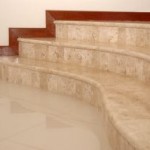When you work with chemicals on a daily basis, it is easy to forget just how dangerous these products can be. The tendency is to forget to treat them with the respect they deserve, and painful injuries are often the result.
Cleaning products are a good example. Most of us use cleaning products fairly frequently, at work and at home. But how many of us actually bother reading the directions or product contents? How many of us use rubber gloves or splash goggles?
Having your hands wet for a long time or having them frequently wet during the day can irritate your skin leading to dermatitis.
Some ingredients in cleaning products can cause skin allergies and asthma. Also, some cleaning products are corrosive and can cause skin burns and eye damage.
Acids and bases are all corrosive, and most cleaners are composed of acids and bases. Think about it: when cleaning, you’re trying to “eat” away the dirt and grime. Most likely, the more effective a product is at eating away the dirt, the more effective it will be at eating away the skin on your hands. It will also do more damage if accidentally splashed in your eyes.
Cleaning products can also be extremely reactive when mixed. Bleach, when mixed with any product containing ammonia (or visa versa), will react to produce deadly chlorine gas. NEVER MIX CHEMICALS, ESPECIALLY CLEANING PRODUCTS. Some people think that if something works well by itself, it might work even better if combined with something else….. Wrong!!! Even emptying a mop bucket with an ammonia containing product into the sink, followed by a sponge full of bleach, can produce enough chlorine gas to be dangerous.
Take whatever steps are necessary to avoid mixing cleaning products. Always run clean water through a drain after dumping any sort of cleaning product down it. Wear rubber gloves, especially when using industrial strength cleaners. If there’s any chance of getting a splash in the eye, wear protective goggles. If you do get a chemical splashed in your eye, wash it with clean water for at least 15 minutes.
Always use common sense to protect yourself, and treat all chemicals with the respect they deserve.

 Thinking about new ways in which you can live a more eco friendly life? Using eco-friendly products around the home can have a great positive impact on the environment. Many non-eco cleaning products contain enzymes, bleaches, brighteners and perfumes.
Thinking about new ways in which you can live a more eco friendly life? Using eco-friendly products around the home can have a great positive impact on the environment. Many non-eco cleaning products contain enzymes, bleaches, brighteners and perfumes. Cleaner of the month is Valya Angelova. She has joined us in June and has received only good feedback so far. Always helpfull and ready to take on more jobs.
Cleaner of the month is Valya Angelova. She has joined us in June and has received only good feedback so far. Always helpfull and ready to take on more jobs. Marble tiles could be used and installed in bathrooms, hallways, pathways, and in many other home locations. One common use for marble tiles is for the flooring. Like all stone, marble is both heavy and brittle. When these factors are combined with poor handling or internal weakness, the marble is liable to break.
Marble tiles could be used and installed in bathrooms, hallways, pathways, and in many other home locations. One common use for marble tiles is for the flooring. Like all stone, marble is both heavy and brittle. When these factors are combined with poor handling or internal weakness, the marble is liable to break. Our Best Cleaner Award this month goes to Irena Sztorc. She started in June and her communication with the agency since then is very good. Irena has a vast experience in cleaning houses and also as a cleaner supervisor.
Our Best Cleaner Award this month goes to Irena Sztorc. She started in June and her communication with the agency since then is very good. Irena has a vast experience in cleaning houses and also as a cleaner supervisor.
